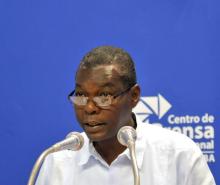
On March 26 Cuba announced that the U.S. and Cuba will commence their discussions regarding human rights on March 31 in Washington, D.C. The next day the U.S. Department of State confirmed that date and location with Under Secretary of State Tom Malinowski as the leader of the U.S. delegation. This meeting’s purpose will be “to discuss the structure and the methodology of future human rights talks” or “the composition of delegations and the topics to be discussed.” [1]
This post will review that announcement, and subsequent posts will provide previews of the issues of Cuban and U.S. human rights that probably will be on the agenda for further talks.

Although these negotiations were first suggested by the U.S. as an essential part of the re-establishment of normal diplomatic relations, Cuba now is the one apparently pressing the discussion of this issue. A Cuban foreign ministry official, Pedro Luis Pedroso, the Deputy Director General of Multilateral Affairs and International Law, said,”These talks are an indication of Cuba’s willingness to address any subject with the [U.S.], despite our differences, based on equality and reciprocity.”
Pedroso added that the planned dialogue is expected to “develop in a constructive environment and on a reciprocal basis, without conditions or discriminatory treatment, and full respect for the sovereign equality, independence and non-interference in the internal affairs of the parties. There are different political systems and models for democracy. … We live in a plural world and that pluralism should apply to the case of Cuba as well.”
According to Pedroso, Cuba will “demonstrate its achievements in the promotion and protection of all human rights, not only of its people but also those of many nations with which it has cooperated in areas such as health and education.” This includes “the recognition Cuba received at the last Universal Periodic Review by the U.N. Human Rights Council, where the international community commended Cuban achievements in areas such as education, health and access to cultural rights, and the contribution the island has made in those same areas in other countries.”
Nevertheless, Cuba admits that it is not perfect and still has areas to improve.
The talks will not only be concerned with Cuban human rights. Pedroso said Cuba will “raise its concerns regarding the human rights situation in the U.S. and elsewhere where [the U.S.] has a direct impact.”
=============================================================
[1] This post is based upon the following sources: Reuters, Cuba Proposes Quick Start to Human Rights Dialogue with U.S., N.Y. Times (Mar. 26, 2015); Assoc. Press, Cuba, US to Launch Human Rights Dialogue Tuesday, N.Y. Times (Mar. 26, 2015); Gomez, Cuba and the US hold talks on human rights, Granma (Mar. 27, 2015); Foreign Ministry: Cuba expects respectful dialogue with US Human Rights next March 31, CubaDebate (Mar. 26, 2015); U.S. Dep’t of State, Daily Press Briefing (Mar. 27, 2015).
At the same time, Cuba will address the concerns they have about the human rights situation in the US and elsewhere where the US has a direct impact.
Cuban delegation responded that the United States bore the stains of police brutality, political detentions and rampant inequality and poverty, insufficient health care coverage as well as the torture and indefinite detention of Guantanamo inmates and illegal and unprovoked wars, military aggressions and embargoes on sovereign states in violation of international treaties.
We are aware that we have profound differences with the US government in the field of political systems, democracy, human rights, and international law. In turn, we have the unwavering will of both countries to interact civilly in the recognition and respect for these differences.
AFP, March 26, 2015
AP, March 26, 2015